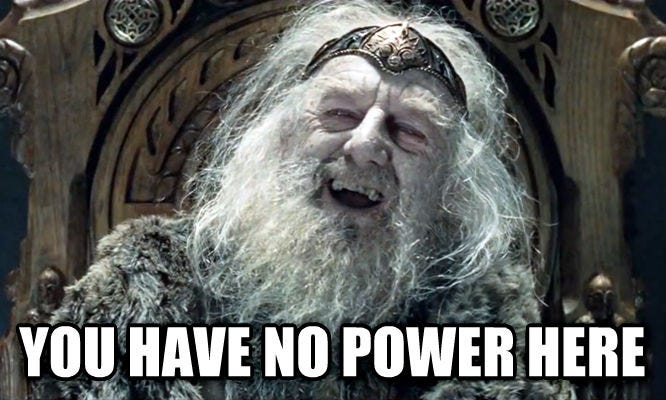Don't feed the trolls: never take unconstructive criticism personally
A quick primer (and for many just a reminder) on why you should never let purposefully negative feedback get under your skin, and thoughts on what to do instead...
If you reach the level others are reacting to your ideas in a critical light, consider yourself lucky. The vast majority never receive any feedback at all. The fact you (or your company) are being mentioned organically is a positive signal even in cases it does not seem that way at first. Media outlets and their personalities have known this for years and by embracing it have formed very thick skin. They don’t take criticism personally, rather, they quietly (and sometimes loudly) leverage it to increase their own exposure through parlaying it into controversy that attracts even more attention, or use it to improve (different brands have different strategies here).
Yet businesses and individuals still aren’t used to getting truly honest feedback or participating in the raw, unfettered nature of online conversations. I’d say only a few percent know how to appropriately process criticism or the steps to potentially put it to work for them.
If you are sharing ideas online (Reddit, Substack, YouTube, Twitter, doesn’t matter) you must grow thicker skin
Those of us who have been around since the early days of boards and forums are the OG web natives, and have the scars to prove it. We remember the days the web was far more real and raw. To be honest, and not to go all Pinker on you, it feels like digital conversations have tamed a bit over the last two decades even while some hem and haw about how polarized we are online, it’s nothing like the former wild west days. Some still carry that unrestricted “find the boundaries and dance on the line” spirit with them and continue to drive the web’s rawest conversations, however it’s clear many who are newer and missed the pioneer days still don’t understand this is the original nature of the web.
The point is, digital conversations that spread tend to be the most honest, passionate and critical as the default, and you need to grow thicker skin and not take things that hold no lessons personally if you hope to survive. What exactly do you gain by internalizing a bad faith conversation or criticism by someone else (no matter who they are) so deeply that it ruins your day? The answer is nothing: you’re expending energy without purpose and have zero to gain by getting upset, letting trolls live in your head rent-free. In fact, in few areas of life is getting so emotionally flustered it fully clouds your logic circuits a productive reaction. Shields up when required, don’t take direct damage. You’re always in control here, you might just not have discovered you have this power yet.
Everyone’s worldview and personality are different
What this means is if you are actually unique and sharing ideas that are interesting and have personality, they inevitably will be interpreted in many different ways by many different people. Along with that – some will love, some will hate – but that’s the nature of doing something personal.
The reverse of this is also true and why so much of the web is unreadable, most don’t share anything with personality that actually speaks to anyone. That takes time and effort, the antithesis of the spam/content mill strategy. I’d argue the Twitter “thread bros” fit this category. Same with AI copy. They’re all trying to take cheap shortcuts making it clear they don’t care. This sort of work requires personality if you hope to actually influence anyone. Why else should anyone really care? Why would they take it seriously? This lack of personality and humanity backing it is also the reason no one reads most warmed over opinion media: they try to appeal to everyone, and upset no one. You might as well not even publish.
If you’re doing things right, you’re going to inevitably spark criticism and debate. That’s sort of the point, and those who get upset someone they disagree with or dislike for ideological reasons is generating reactions – whether positive or negative – show a lack of understanding of humanity. Debate is good, actually. I’d personally much rather have a world we’re all engaged in spirited, passionate discussion than passively entertained and silent/fearful of sharing our thoughts.
With that, not everything requires a response from you or your company
Sometimes, the best move is no move at all (see my previous post on strategies of war for several practical applications of this). Depending on the situation and your strategy, you might actually be wrong about something you’re in no position to defend (I’m not advising you actually do this, but what if it’s the case you’re being controversial purely for the sake of getting links and attention and don’t actually believe what you’re saying - essentially clickbait). In that instance, you might not want to respond to everyone whose buttons you just pushed. Again I am not suggesting you engage in these sort of tactics (as they result in low quality followers, and now you are the one who is trolling) but it’s something a lot of people insist on doing, so a simple illustration. But to drive home the point of this one: if pure clickbait trolls know enough about when not to engage, you should learn that too.
Taking criticism the wrong way makes you appear insecure and unsure
If you react to (either valid or troll-ish) criticism personally, in many cases this can make you seem guilty by association (and hinder the importance of your thoughts). If you react calmly and rationally your response can be a great thing: audiences will want to read what happens next and the party who responded initially will usually link the next piece of the conversation if they’re well-meaning adults and respectful of debate. But freaking out about the situation and giving an impassioned, immediate/emotional response is almost always going to make you look worse than something measured and logical. Take a deep breath before you proceed.
When appropriate, leverage criticism for results - a potential superpower your competitors are likely afraid to take advantage of
Analysis, commentary and controversy are proven frameworks: ignore them at your own peril. But they open yourself up to critical commentary. If you ignore these tenants of attention and decide to play it safe, how can you possibly expect to be as interesting and receive as much airtime as competitors (and not simply business competitors, but mindshare competitors, which now includes everything)? When so much of the world now lives in fear/plays to the middle and refuses to have opinions and take sides for fear of upsetting others, it’s a huge opportunity for you to do the opposite and position against fearful “by the rules” competitors. Most people and companies are now existentially afraid to tap into any of our innate creativity on this one. Corporate America and our current “cancel culture” for sure has created a situation many self-censor to the point they lose all humanity and persuasion. I would argue the scales have clearly tipped too far here, and any of the initial good intentions (aside: are there actually good intentions of trying to cancel others instead of rehabilitate and mentor? Always seems quite childish to me and a sign of an immature culture) are gone. Meaning: this is a real opportunity. All you need to do is stop optimizing for mediocrity and have a point of view. Set your creative team members free. Take a “fear nothing” mindset. Also, learn the unwritten rules that govern groups online so you can be fluent in group psychology which you’ll need to understand innately here.
If you share industry-specific ideas not well sourced, don’t be surprised if others pick them apart, ruthlessly and publicly
The reason isn’t personal, it’s because you’re spreading misinformation about something a group is highly passionate about and is the main focus of their professional life. So they are going to challenge your ideas if bold or iconoclast, vehemently. And remember, just because someone publishes a stat or data point doesn’t make it accurate or accountable so don’t be so quick to use what you stumble upon for your own marketing or sales efforts. Look carefully into sources, methodologies and sample sizes of any data you’re about to use for citation. If it’s not legitimate or defensible and you use it, of course you’re going to get taken to task by industry insiders.
The more popular your work, the more critical reactions will be

Popularity and criticism are directly proportional in nearly all verticals and types of idea. Think about music as one example: those really passionate about music are going to be inevitably critical about popular music that follows predictable archetypes and takes no risks or has cheesy, shallow lyrics. Or even movies – movie buffs are going to rip most blockbusters and sequels apart. Rightfully so, in both cases. The inner circle are usually bored with what’s popular because it’s overdone in their eyes, ensuring the more popular something is, the more critical reactions will be. Popularity means profitability, at least in the near term, but generally correlates inversely with quality.
Audiences (but not influence) tend to gravitate to the middle: if you want more readers just be shallower. But if you want greater real influence and trust, go deeper. Appeal to the weird, the iconoclast, the irrationally committed. And, as you go deeper, the reactions will usually be less troll-ish and more high value discussion-oriented among the influential minority. It all depends what your goals are. Also keep in mind ideas that don’t get a ton of attention or critique (positive or negative) initially might simply require longer to percolate in the culture.
Conclusion
You should work hard to develop a keen understanding of how others are likely to react to your ideas and proceed with that in mind during planning and concepting. But at no point in you or your company’s interactions, ideas or art shared with the world should you take critical responses personally (particularly the bad faith variety). Learn from them, nurture relationships that require it, take action to improve, absolutely. But investing emotion especially in cases where it’s purely someone or group of people taking out their aggregation unconsciously or otherwise is altogether futile. It’s just not a productive use of time and will always drain precious energy and motivation more than help.
Many of you already know the above but it’s clear from my observations equal parts don’t, so I hope putting down thoughts was helpful to anyone still struggling get to a better place with criticism and feedback in the public sphere.






